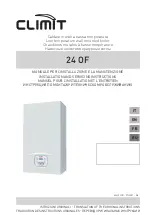
20
Part No. 5106463
Pre-Installation Requirements
Tank Support
Steel tanks are normally supported on masonry piers.
These have to maintain the tank at a sufficient height to
enable access to be gained for painting.
Requirements for Tank Accommodation
Reference should be made to the relevant building
regulations, bye-laws, etc. in order to achieve a satisfactory
degree of safety in relation to the methods of protection.
Underground tanks are also referred to in BS 5410:Pt.1.
BS 5410:Pt.2 gives more detailed guidance on the burying
of steel tanks.
The Scottish Building Standard requirements for
underground tanks are the same as those of BS 5410:Pt.1.
Methods of Tank Protection
It is considered unlikely that a fire will originate from the
stored oil and it is the purpose of these recommendations
to ensure that a fire which may originate from a building
or other external source is not transmitted to the tank
contents.
Adequate safety may be achieved in a number of ways,
for example:
a) Protecting the tank by a physical barrier or isolating
the tank by sufficient space;
b) Enclosing the tank by non-combustible fire resisting
construction; i.e., putting the tank underground.
Oil Storage Tank & Supply Installations
Oil Tank Types
Steel Tanks
Steel tanks should be constructed so as to comply
with BS 799:Pt.5:1987. Galvanised steel pipework or
valves must never be used for oil storage or supply
systems.
Plastic Tanks
Tanks made from plastics material are now available.
Oil should never be stored in translucent plastic
containers.
Fig. 14
















































